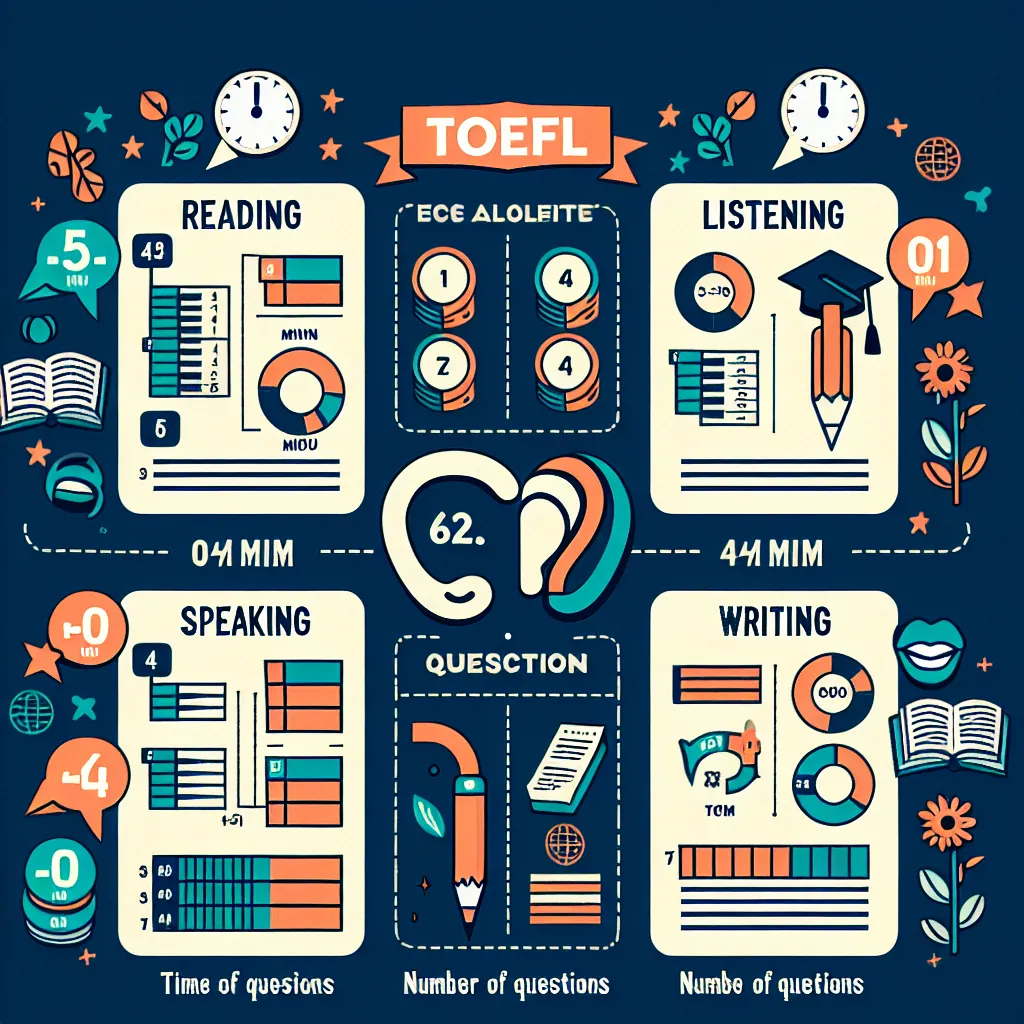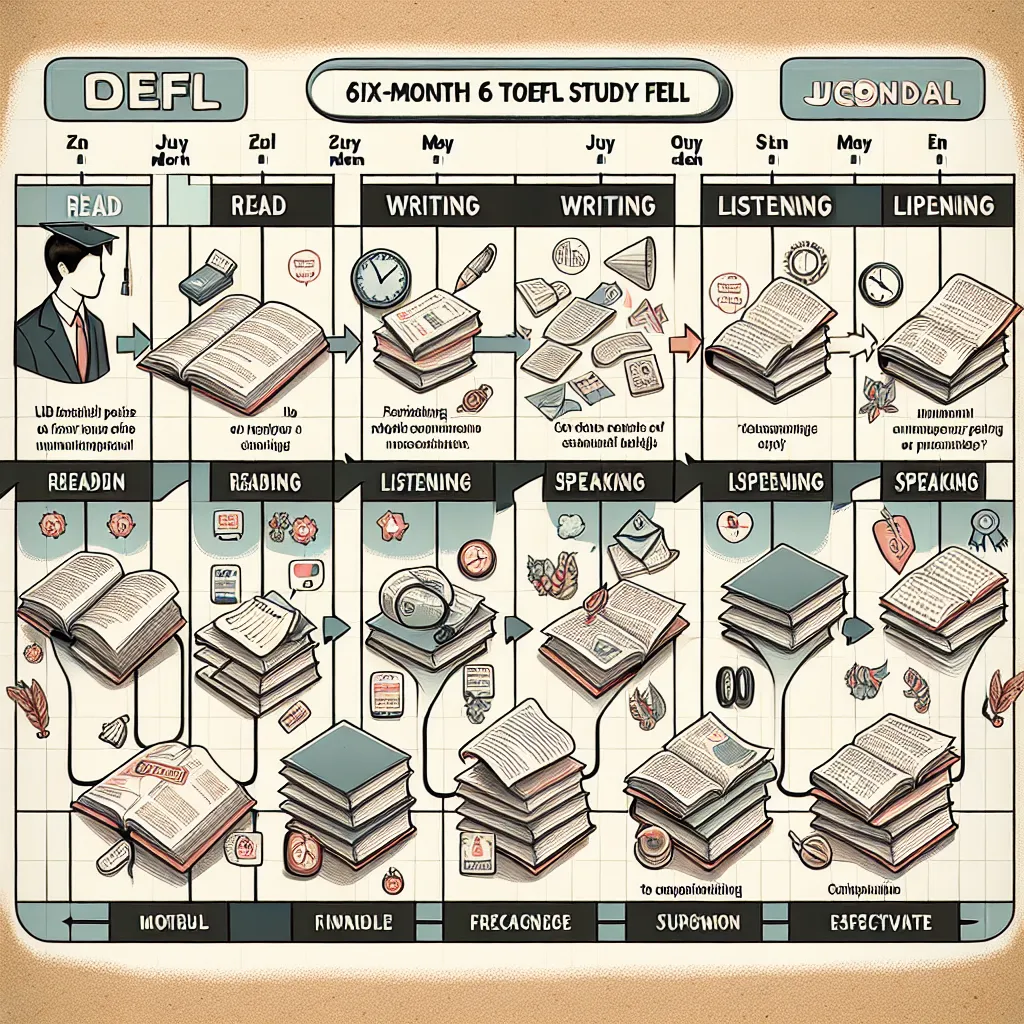Are you preparing for the TOEFL test and wondering how much time you should dedicate to your studies? This is a common question among test-takers, and the answer can vary depending on several factors. In this comprehensive guide, we’ll explore the ideal study duration for the TOEFL test and provide you with valuable insights to help you plan your preparation effectively.
Understanding the TOEFL Test
Before diving into the specifics of study duration, it’s essential to understand what the TOEFL test entails. The Test of English as a Foreign Language (TOEFL) is a standardized test that measures your ability to use and understand English at the university level. It consists of four sections: Reading, Listening, Speaking, and Writing.
 TOEFL Test Structure
TOEFL Test Structure
Factors Affecting Study Duration
Current English Proficiency Level
Your current level of English proficiency plays a significant role in determining how long you should study for the TOEFL test. Here’s a general guideline:
- Beginner to Intermediate: 6-12 months
- Upper Intermediate: 3-6 months
- Advanced: 1-3 months
It’s important to note that these are rough estimates, and individual progress may vary.
Target Score
Your target score is another crucial factor. If you’re aiming for a high score (100+), you may need to dedicate more time to your studies compared to someone targeting a lower score.
Available Study Time
Consider how much time you can realistically dedicate to TOEFL preparation each day or week. Consistency is key, so it’s better to study for shorter periods regularly than to cram intensively for a short time.
Familiarity with the Test Format
If you’re already familiar with the TOEFL test format and question types, you may require less study time compared to someone who is encountering the test for the first time.
Creating an Effective Study Plan
Step 1: Take a Diagnostic Test
Start by taking a full-length practice TOEFL test to assess your current level and identify areas that need improvement. This will help you create a targeted study plan.
Step 2: Set Realistic Goals
Based on your diagnostic test results and target score, set realistic goals for each section of the TOEFL test. This will help you stay motivated and track your progress.
Step 3: Allocate Study Time
Divide your available study time among the four TOEFL sections, focusing more on areas that need the most improvement. A balanced approach is crucial for overall success.
Step 4: Use Quality Study Materials
Invest in high-quality TOEFL preparation materials, including official practice tests, textbooks, and online resources. [internal_links]
Step 5: Practice Regularly
Consistency is key when preparing for the TOEFL test. Aim to study for at least 1-2 hours daily, focusing on different skills and sections each day.
Sample Study Schedules
3-Month Study Plan
For those with upper-intermediate to advanced English skills:
- Week 1-4: Focus on familiarizing yourself with the test format and improving your weakest skills.
- Week 5-8: Intensive practice for all four sections, with emphasis on timed practice tests.
- Week 9-12: Fine-tuning your skills, working on time management, and taking full-length practice tests.
6-Month Study Plan
For those with intermediate English skills:
- Month 1-2: Build a strong foundation in grammar, vocabulary, and basic test-taking strategies.
- Month 3-4: Focus on individual sections, practicing specific question types and developing section-specific strategies.
- Month 5-6: Integrate skills through full-length practice tests and targeted review of weak areas.
 TOEFL Study Plan
TOEFL Study Plan
Tips for Effective TOEFL Preparation
- Immerse yourself in English: Watch English movies, listen to podcasts, and read English news articles daily.
- Practice speaking English regularly, even if it’s just talking to yourself.
- Use spaced repetition techniques for vocabulary learning.
- Take timed practice tests to improve your time management skills.
- Join TOEFL study groups or find a study buddy for motivation and speaking practice.
Common Mistakes to Avoid
- Procrastination: Start your TOEFL preparation early to avoid last-minute stress.
- Neglecting certain sections: Ensure you’re giving adequate attention to all four sections of the test.
- Ignoring the importance of time management: Practice working within the time constraints of each section.
- Not seeking feedback: Have your speaking and writing responses evaluated by a tutor or experienced TOEFL taker.
When to Take the TOEFL Test
Once you’ve consistently achieved your target score on full-length practice tests, you’re likely ready to take the actual TOEFL test. However, consider scheduling your test date at least 2-3 weeks in advance to allow for any last-minute preparation and to ensure you can retake the test if necessary.
Conclusion
The amount of time you should study for the TOEFL test varies depending on your current English proficiency, target score, and available study time. By creating a structured study plan, using quality materials, and practicing consistently, you can effectively prepare for the TOEFL test and achieve your desired score. Remember, the key to success is not just the duration of your studies, but the quality and consistency of your preparation. Good luck with your TOEFL journey!




